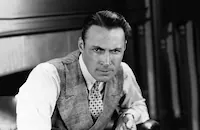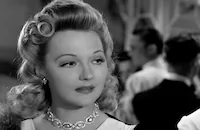International Crime
Brief Synopsis
Cast & Crew
Charles Lamont
Rod La Rocque
Astrid Allwyn
Thomas Jackson
Oscar O'shea
Lew Hearn
Film Details
Technical Specs

Synopsis
Newspaperman Lamont Cranston is known for his crime busting daily column in The Star as well as his nightly broadcasts as "The Shadow" on the ^The Star radio station. Though the public adores him and criminals fear him, police inspector Weston merely thinks of him as a thorn in his side. One night, when cub Star reporter Phoebe Lane, who happens to be the owner's niece, comes into the station with a story about an imminent robbery, The Shadow broadcasts the information. When he and the police arrive at the supposed robbery site, though, they find nothing, but soon hear that there has been an explosion elsewhere in town and decide to investigate. The explosion happened at the home of financier Gerald Morton, who was killed in what appears to police to be a robbery attempt on his safe. The Shadow doesn't buy the robbery theory, however, even though the modus operandi is that of famed safecracker "Honest John." To keep the Shadow out of his hair, Weston has him arrested as a material witness, but Phoebe and his driver Moe get him out of jail in time for his next broadcast. During the program, Honest John breaks into the studio and forces the Shadow at gunpoint to say that he is not the killer. The audience believes that the whole thing is a joke, but the Shadow still maintains John's innocence, even after he escapes from the studio. Meanwhile, Morton's brother Roger and his attorney come to the station to protest the Shadow's implication that Morton was involved in some crooked dealings. The next day, The Shadow helps Phoebe to recall that the man who told her about the bogus robbery had a Viennese accent. They go to Viennese restaurants looking for him and eventually discover the man, who is named Flotow. The Shadow poses as an Austrian baron and Phoebe poses as his wife. Though Flotow says that Phoebe looks familiar, she denies ever meeting him. After the Shadow turns down an invitation to Flotow's apartment, they agree to meet the next day for lunch. While The Shadow writes letters of apology to the police, at their behest, Flotow and his cohort Storkhov make plans to do away with "the Baron," whom they know to be The Shadow. At lunchtime, while Flotow and Storkhov await the Shadow, he searches Flotow's apartment and is interrupted by the eager Phoebe. Soon after a man with a German accent telephones the apartment, two men come to the door and confront Phoebe and the Shadow. They are saved just in time by Moe, who uses a cigarette case shaped like a gun to fool the thugs. Because the Shadow has been able to obtain incriminating evidence on the international financing of Germanic aristocrats, he writes a column saying The Shadow knows who the killers are and accuses the police of stupidity in handling the case, again angering Weston. As The Shadow leaves his office, Honest John confronts him in Moe's taxi, but reveals that he really has been trying to go straight and agrees to join forces with The Shadow to find the real killer. They go to Roger Morton's house, where Flotow and his friends confront Roger, ordering him to hand over bonds from the safe that he, and not his brother Gerald, had been handling for them. They try to convince Roger to kill himself, but he will not. A short time after the Shadow and Honest John arrive, followed by the police, who had been told by Phoebe of the Shadow's whereabouts, everyone is arrested, leaving The Shadow free just in time for his next broadcast.

Director
Charles Lamont
Cast

Rod La Rocque

Astrid Allwyn
Thomas Jackson
Oscar O'shea
Lew Hearn
Wm. Von Brinken
Tenen Holtz
Wm. Pawley
Wm. Moore
John St. Polis
Jack Baxley
Walter Bonn
Harry Bradley
Will Stanton
Lloyd Whitlock
Crew
Arthur Alexander
Max Alexander
Edward L. Alperson
Ralph Berger
Charles Henkel Jr.
A. E. Kaye
Dr. Edward Kilenyi
John Krafft
Marcel Le Picard
Harold Lewis
Jack Natteford
Glenn Rominger
Henry Spitz
Alfred Stern

Film Details
Technical Specs

Quotes
Trivia
Notes
The film had two working titles, The Shadow Speaks and The Shadow Murder Case, and was copyrighted under the title The International Crime. A press kit for the film contained in the copyright files credits Glenn Rominger with sound supervision, while the film credits A. E. Kay, and Daily Variety credits Rominger with sound recording. Although the viewing print of the film had no screenplay credit, Screen Achievements Bulletin, copyright records and reviews credit the screenplay to Jack Natteford and the short story to Maxwell Grant. A pre-production news item in Hollywood Reporter states that John Krafft was to write the original story and screenplay for the film. Only the Motion Picture Herald and Hollywood Reporter credit Krafft with the dialogue. This was the second "Shadow" film produced by Colony and distributed by Grand National. For additional information on films featuring the character of The Shadow, for The Shadow Strikes.












